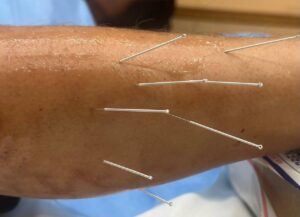
Introduction
Shoulder pain can significantly impact daily activities, affecting mobility, sleep, and overall quality of life. While conservative treatments like physical therapy, medications, and lifestyle modifications help many patients, some may require more targeted interventions. Shoulder injections are an effective treatment option for managing pain and inflammation, but when should you consider them?

Common Causes of Shoulder Pain
Before exploring injections, it’s essential to understand the common causes of shoulder pain:
- Rotator Cuff Injuries – Tendinitis, partial tears, or full-thickness tears.
- Frozen Shoulder (Adhesive Capsulitis) – Stiffness and pain due to inflammation.
- Shoulder Arthritis – Wear and tear of the joint leading to pain and restricted movement.
- Bursitis & Tendinitis – Inflammation of the bursae or tendons.
- Shoulder Impingement Syndrome – Compression of soft tissues leading to pain.
- Post-Surgical Pain – Residual discomfort after shoulder surgeries.

When to Consider Shoulder Injections?
If you have persistent shoulder pain despite trying conservative treatments, injections might be the next step. Consider injections if:
- Pain interferes with daily activities and sleep.
- Physical therapy and oral medications (NSAIDs, muscle relaxants) haven’t provided relief.
- You have significant inflammation that limits movement.
- You want to avoid or delay surgery.

Types of Shoulder Injections
Several types of injections can help relieve shoulder pain, depending on the underlying condition:
1. Corticosteroid Injections
- Best for: Inflammatory conditions like bursitis, arthritis, and tendinitis.
- How it works: Reduces inflammation and provides temporary pain relief.
- Duration: Relief lasts weeks to months, but repeated use should be limited.
2. Platelet-Rich Plasma (PRP) Therapy
- Best for: Rotator cuff injuries, tendinitis, mild arthritis.
- How it works: Uses growth factors from the patient’s blood to promote tissue healing.
- Duration: Long-term healing potential, but results take a few weeks to develop.
3. Hyaluronic Acid (Viscosupplementation) Injections
- Best for: Osteoarthritis of the shoulder.
- How it works: Lubricates the joint, reducing friction and pain.
- Duration: Effects last several months, delaying the need for surgery.
4. Nerve Blocks & Radiofrequency Ablation (RFA)
- Best for: Chronic shoulder pain from nerve irritation.
- How it works: Temporarily or permanently blocks pain signals from nerves.
- Duration: Nerve blocks provide short-term relief, while RFA can last months to years.
5. Medical Ozone Therapy
- Best for: Chronic inflammation, arthritis, and tendon injuries.
- How it works: Delivers ozone gas into the affected area to reduce inflammation and promote healing.
- Duration: Multiple sessions may be required for optimal results.

What to Expect During the Injection Procedure?
- Performed in a clinic under sterile conditions.
- May be guided by ultrasound or fluoroscopy for accuracy.
- Minimal discomfort; local anesthesia may be used.
- Patients can resume light activities the same day but should avoid strenuous movements for 24-48 hours.

Post-Injection Care & Recovery
- Apply ice packs to reduce swelling.
- Avoid heavy lifting or strenuous activity for a few days.
- Monitor for side effects like temporary soreness or swelling.
- Follow up with your pain specialist for continued care.

Conclusion
Shoulder injections can be a valuable tool for pain relief when conservative treatments are not enough. They provide targeted relief, reduce inflammation, and in some cases, promote healing. If you’re struggling with persistent shoulder pain, consult a pain specialist to determine if injections are the right option for you.
For expert guidance and personalized treatment, visit ALGOS Pain Clinic or schedule a consultation today!
#ShoulderPain #PainRelief #CortisoneInjection #PRPTherapy #HyaluronicAcid #MedicalOzone #PainManagement #RegenerativeMedicine

REFERENCES
- Shaffer B, Tibone JE, Kerlan RK. Frozen shoulder: a long-term follow-up. J Bone Joint Surg Am. 1992;74(5):738–746.
- Hannafin JA, Chiaia TA. Adhesive capsulitis: a treatment approach. Clin Orthop Relat Res. 2000;(372):95–109.
- Buchbinder R, Hoving JL, Green S, Hall S, Forbes A, Nash P. Short course prednisolone for adhesive capsulitis (frozen shoulder or stiff painful shoulder): a randomised, double blind, placebo controlled trial. Ann Rheum Dis. 2004;63(11):1460–1469. doi: 10.1136/ard.2003.018218.
- Waldburger M, Meier JL, Gobelet C. The frozen shoulder: diagnosis and treatment. Prospective study of 50 cases of adhesive capsulitis. Clin Rheumatol. 1992;11(3):364–368. doi: 10.1007/BF02207194.





